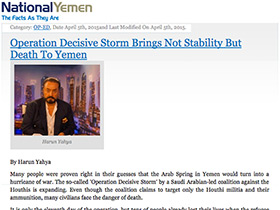
Many people were proven right in their guesses that the Arab Spring in Yemen would turn into a hurricane of war. The so-called ‘Operation Decisive Storm‘ by a Saudi Arabian-led coalition against the Houthis is expanding. Even though the coalition claims to target only the Houthi militia and their ammunition, many civilians face the danger of death.
It is only the eleventh day of the operation, but tens of people already lost their lives when the refugee camp in the north of the country was hit. The situation became even more grim with claims like that of Pablo Marco, the Director of Medecins Sans Frontieres , who said that the refugee camp was targeted in a planned airstrike. (1)
As people speculate over the start of a ground operation, it seems almost certain that the civilian death toll will increase. The interesting thing about the operation is that it started without a certain military target, and this makes even the USA, the biggest supporter of the operation, uncomfortable. Jeff Rathke, one of the spokespeople for the State Department, said that they didn’t want it to be an open-ended operation (2).
It is possible to estimate when storms will end, but no one knows when the ‘Operation Decisive Storm’ will be over. Is the goal destroying the Houthis completely? Or is it to make them surrender? What conditions do they require for surrender? None of these are certain.
This uncertainty raises the likelihood of the expansion of the war and a rising death toll. In any event, it is very difficult to ensure peace in the country by military means because even if the Houthi militants lay down their weapons, the Zaydis will continue to live in the country and the devastation brought by the war will hurt not only the Zaydis of Yemen, but also its Sunni citizens.
The negative outcomes of the Arab Spring suggest that this war will not be successful in bringing peace, justice and stability to Yemen. When Muslims were killed in Iraq and Afghanistan, everyone held the Western countries responsible for it, especially the USA. However, the events that followed and the current scene in Yemen make it clear that conflict amongst the Arabs can be as bloody as conflicts with the Western world.
In other words, the scenarios of war do not change:
A dictator that treats his country like a family company and runs it with an iron fist; an intimidated, silenced people. A rise of public uproar, an overthrown dictator. Deteriorating stability and rising ethnic and sectarian differences. The start of a conflict that transforms into an unending war.
The locations and the names change, but the scenario stays the same. But is it always going to be like this? Is this scenario always going to be written with blood and death? A conflict reminiscent of the current situation in the Middle East was seen in Europe 350 years ago. The Thirty Years War and the Eighty Years War, resulting from some Kings favoring certain sects over others, brought about an enormous change to Europe. After this transformation, one that continued for centuries, sectarian clashes were abandoned and although new kingdoms and dictatorships were formed, eventually the continent found its peace in democracy.
Some analysts believe that the Muslims in the Middle East will follow the same path. This partly results from the misconception that ISIS, Boko Haram, Al-Qaeda and their likes draw their violent ways from Islam. Even though it is strictly forbidden in the Qur’an, many radical Shi’a and Sunni Muslims think that it is a part of their faith that people not from their sects should be killed.
These people, although they do not live by the compassionate, loving and considerate morality commanded by religion, pose as ‘pious’ people. As a result of this erroneous propaganda, millions of people misunderstand Islam. They even may come to wrongly think that Islam restricts freedom and liberties, controls thoughts and even encourages bloodshed. However, Islam is a peaceful religion that gives people the freedom of thought and expression and protects the rights of people. Almighty God explains this in a verse:
There is no compulsion where the religion is concerned. Right guidance has become clearly distinct from error. Anyone who rejects false gods and has faith in God has grasped the Firmest Handhold, which will never give way. God is All-Hearing, All-Knowing. (Surat al-Baqara, 256)
There are also other verses in Quran that prove that there can be no compulsion in religion: 88/21-22, 109/1-6 and 18/29 in the Holy Qur’an are amongst them.
Be they Zaydi or Sunni, all Muslims in Yemen aim to adopt the beautiful morality God commands and to live and spread the religion the way God teaches us. And no doubt, when people live by the morality God commands, the long-awaited peaceful atmosphere of democracy can be achieved in Yemen. When all Muslims, including those in Yemen, Saudi Arabia, Iran and Turkey unite, their strength will be a deterrent force to those warmongers willing to start anarchy and conflict at every opportunity.
A very important final thought should be kept in mind: It is not military operations that will bring stability to Yemen, it is more democracy and the belief that Muslims are brothers and sisters.
Adnan Oktar's piece on National Yemen & Daily Mail:



